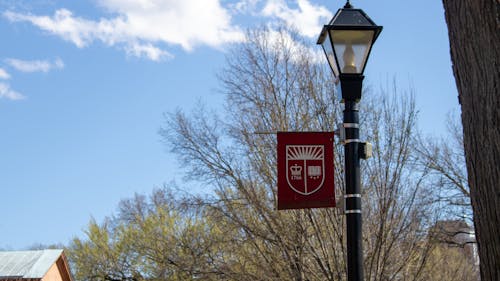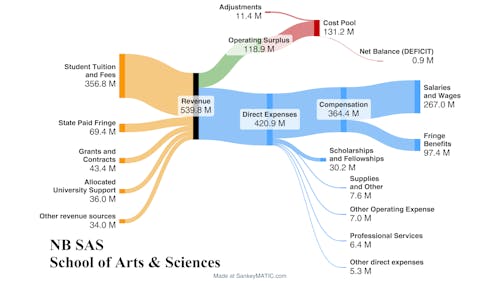Three Rutgers faculty unions hold town hall on alleged U. budget discrepancies

On Tuesday night, the Rutgers American Association of University Professors and American Federation of Teachers (AAUP-AFT), the Rutgers Adjunct Faculty Union (PTLFC) and the American Association of University Professors at the Biomedical and Health Sciences of New Jersey (AAUP-BHSNJ) hosted "The RU Budget Screw: How the Rutgers Budget System Shortchanges Us All," a town hall event to discuss disparities and doubt around the University's fiscal year budget.
Michelle Gittelman, an associate professor in the Department of Management and Global Business and chair of the Budget and Priorities Committee of Rutgers AAUP-AFT, and other union leaders gave insights on financial details University President Jonathan Holloway shared at his third annual budget address in February.
Rebecca Givan, an associate professor in the Department of Labor Studies and Employment Relations, the general vice president of Rutgers AAUP-AFT and the event's moderator, gave an opening statement to acknowledge those who contributed to the conclusions presented at the town hall.
Gittelman's presentation focused on the "Cost Pool" category of the University's 2024 fiscal year budget, of which she said the breakdown of its use is unclear. Rutgers AAUP-AFT specifically broke down what this budget division looks like for the School of Arts and Sciences, in which the cost pool accounts for approximately $131 million.

Gittelman said this section of the budget is intended to account for overhead operating costs, but the ratios between students' and academic units' expenses and their respective cost pools are inconsistent with this analysis. These overhead costs include University resources that do not typically generate revenue, such as libraries, information technology and University administration.
She said academic units' surpluses fund these parts of the University in a system called responsibility-centered management (RCM).
Gittelman also said that students at Rutgers—Newark and Rutgers—Camden pay more per capita than their peers at Rutgers—New Brunswick, despite the campuses being far smaller than the New Brunswick campus.
She also discussed issues with a lack of transparency under RCM. She cited another school as an example of a higher education institution that has one consistent, publicized rate that all academic departments pay.
At Rutgers, she said the uncertainty around the central cost pool disrupts academic unit leaders from being able to budget, as they are not provided with an understanding of the direct and indirect costs incurred by their respective departments.
"The structural deficits are hypotheticals — they're very conservative — but the cuts are very real. And so, we're having a lot of cuts that are happening despite an overall solid and improving financial situation," she said. "And it's important to ask, 'Who's making decisions about these cuts?'"
An additional disparity Gittelman discussed was the unequal treatment of different sources of financial strain. She cited Mark Killingsworth, a professor in the Department of Economics, who said that some types of debt are accepted.
She said the University's misaligned financial priorities hinder institutions from fulfilling their potential.
"As put by one (Rutgers) Law School administrator, Rutgers is a flagship public law school, and if it would be given a 10th of the money of (Rutgers) Athletics — if it was treated like an investment — it could be the (University of California, Berkeley School of Law) of the East Coast," she said.
Gittelman also said the University's administration has flexibility with budgeting that academic branches of the institution are not afforded.
"We, the academic units, are responsible for covering our own expenses, including paying for central," she said. "But central is not accountable to the units for its spending decisions, so there's a real imbalance there."
At the end of Gittelman's presentation, Tara Matise, a professor in the Department of Genetics, shared a presentation on funding difficulties faced by grant-funded principal investigators (PI). Despite agreements made by the University to simplify the process for acquiring lab funding, such as an initiative around bridge funding, many PIs have not received their grants, according to Matise's presentation.
Bryan Sacks, the president of Rutgers PTLFC, then discussed the impacts of the University's cost reduction strategies, as well as echoed Gittelman's perspectives on the University's budget strategy. One such initiative was increasing maximum enrollment in a given course, according to Sacks.
"When maximum (enrollments) are significantly increased, as is happening in some departments, lecturers are effectively denied the fruits of the groundbreaking contract that we just won," he said.
He said the University also made fewer lecturer-taught courses available as a means to lower expenses, which could delay graduation times for students who need certain courses to graduate.
Sacks added that the support of department leaders is vital in protecting the work of lecturers.
The town hall concluded with a Q&A panel among union members and the opening of smaller circles to discuss department grievances.



